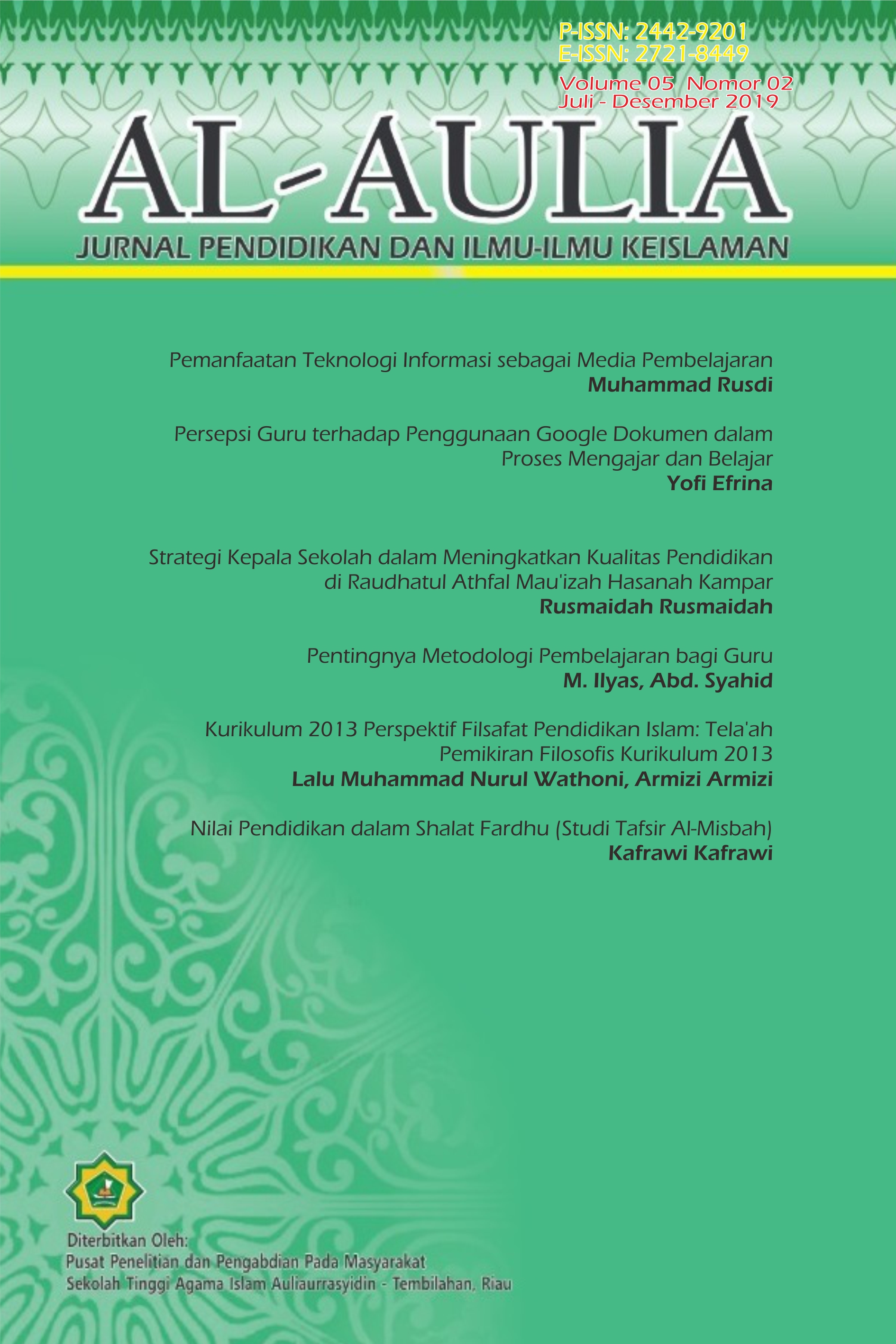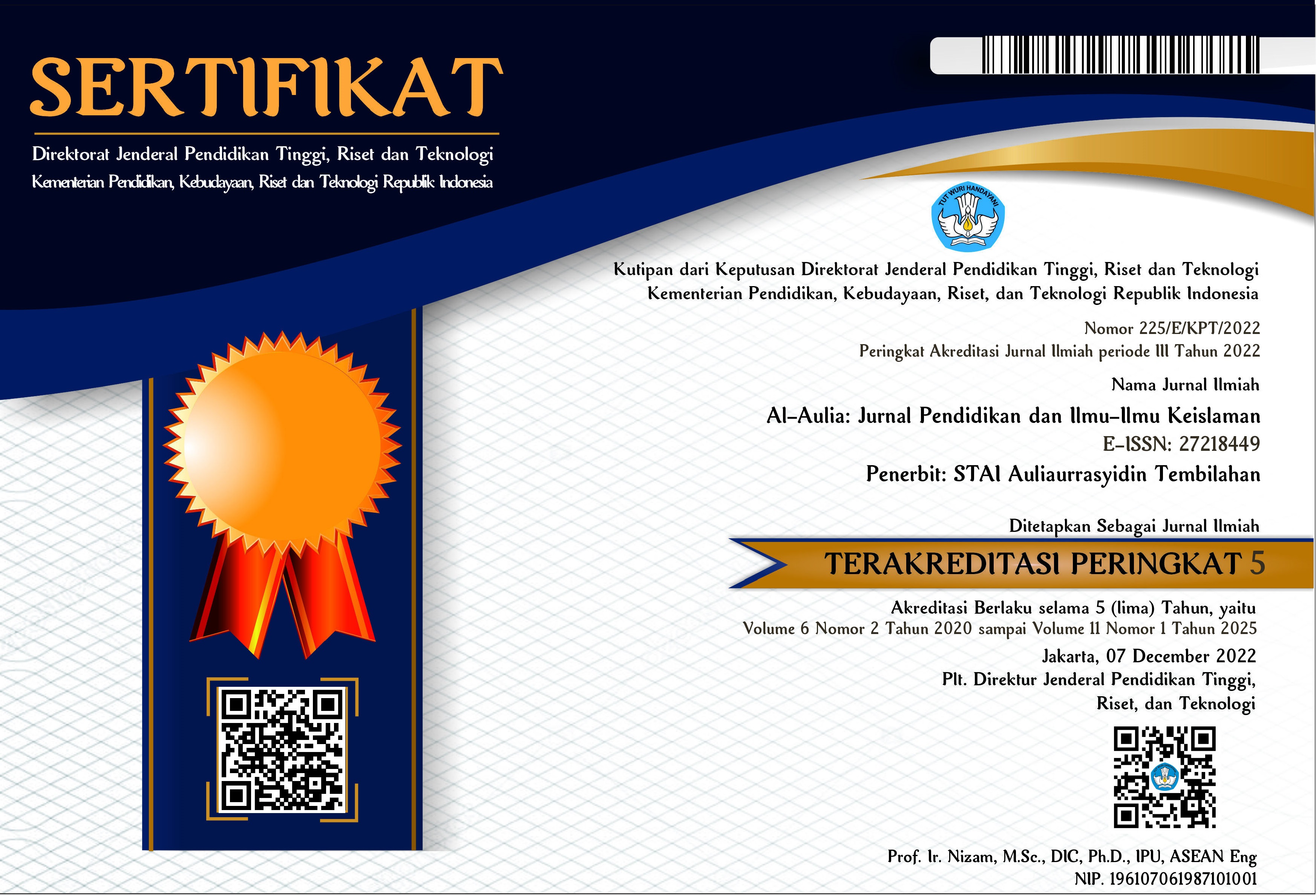Persepsi Guru terhadap Penggunaan Google Dokumen dalam Proses Mengajar dan Belajar
Keywords:
Perception, Google Docs, Teaching and LearningAbstract
Google Docs is a free web-based application for creating, editing, and collaborating. This systematic review shows that using multiple Google documents results in the development of learning and teaching English. Writing is the biggest language skill investigated. Google Docs is a version of Microsoft Word that offers collaborative features that can be used to facilitate teaching and learning in language classes. The method used in writing this paper is a literature study based on collecting data and information related to the teacher's perception of the use of Google Docs in the teaching and learning process. This paper shows the teacher's perception of the use of Google documents in the teaching and learning process in the classroom. There are four overarching topics that develop from the reactions given by the teacher's confession. These fundamental topics are student engagement, classroom adaptability, educator and student reinforcement, and timing skills.
References
Aaron, L. S., & Roche, C. M. (2011). Teaching, learning, and collaborating in the cloud: Applications of cloud computing for educators in post-secondary institutions. Journal of Educational Technology Systems, 40(2), 95-111.
Blumenfeld, P., Fishman, B. J., Krajcik, J., Marx, R. W., & Soloway, E. (2000). Creating usable innovations in systemic reform: Scaling up technology-embedded project-based science in urban schools. Educational psychologist, 35(3), 149-164.
Bodenhausen, G. V., & Hugenberg, K. (2009). Attention, perception, and social cognition. Social cognition: The basis of human interaction, 1-22.
Boyes, N. (2016). Building autonomy through collaborative writing with Google Docs. CUE Journal, 9(3), 228-238.
Burrus, J., Jackson, T., Xi, N., & Steinberg, J. (2013). Identifying the most important 21st century workforce competencies: An analysis of the Occupational Information Network (O* NET). ETS Research Report Series, 2013(2), i-55.
Cope, C., & Ward, P. (2002). Integrating learning technology into classrooms: The importance of teachers' perceptions. Journal of Educational Technology & Society, 5(1), 67-74.
Demirci, N. (2010). Web-based vs. paper-based homework to evaluate students’ performance in introductory physics courses and students’ perceptions: two years’ experience. International Journal on E-learning, 9(1), 27-49.
Denton, D. W. (2012). Enhancing instruction through constructivism, cooperative learning, and cloud computing. Tech Trends, 56(4), 34-41.
Ertmer, P. A., Ottenbreit-Leftwich, A., & York, C. S. (2006). Exemplary technology-using teachers: Perceptions of factors influencing success. Journal of computing in teacher education, 23(2), 55-61.
Foulger, T. S., Wetzel, K., & Buss, R. R. (2019). Moving toward a technology infusion approach: Considerations for teacher preparation programs. Journal of Digital Learning in Teacher Education, 35(2), 79-91.
Greenhow, C., Robelia, B., & Hughes, J. E. (2009). Response to comments: Research on learning and teaching with Web 2.0: Bridging conversations. Educational Researcher, 38(4), 280-283.
Himsworth, J. B. (2007). Why resistance? Elementary teachers' use of technology in the classroom (pp. 1-205). Teachers College, Columbia University.
Jackson, B. C. (2013). Teachers' Preparation Needs for Integrating Technology in the Classroom. ProQuest LLC. 789 East Eisenhower Parkway, PO Box 1346, Ann Arbor, MI 48106.
Jahedizadeh, S., Ghanizadeh, A., & Ghonsooly, B. (2016). The role of EFL learners’ demotivation, perceptions of classroom activities, and mastery goal in predicting their language achievement and burnout. Asian-Pacific Journal of Second and Foreign Language Education, 1(1), 1-17.
Khalil, Z. M. (2018). EFL students’ perceptions towards using Google Docs and Google Classroom as online collaborative tools in learning grammar. Applied Linguistics Research Journal, 2(2), 33-48.
Lane, C., & Lyle, H. (2009, June). The differing technology support needs of beginner and expert users: Survey findings from the University of Washington. In EdMedia+ Innovate Learning (pp. 2431-2436). Association for the Advancement of Computing in Education (AACE).
Loveless, A. M. (2003). The interaction between primary teachers' perceptions of ICT and their pedagogy. Education and Information Technologies, 8(4), 313-326.
Lyle, K. E. (2009). Teachers' perceptions of their technology education curricula (Doctoral dissertation, Immaculata College).
McCannon, M., & Crews, T. B. (2000). Assessing the technology training needs of elementary school teachers. Journal of Technology and Teacher Education, 8(2), 111-121.
Namaziandost, E., & Nasri, M. (2019). The impact of social media on EFL learners’ speaking skill: a survey study involving EFL teachers and students. Journal of Applied Linguistics and Language Research, 6(3), 199-215.
Ragupathi, K., & Hubball, H. (2015). Scholarly Approaches to Learning Technology Integration in a Research-Intensive University Context. Transformative Dialogues: Teaching and Learning Journal, 8(1).
Roach, B. (2010). Educational technology in the classroom from the teacher's perspective. Fielding Graduate University.
Storch, N. (2011). Collaborative writing in L2 contexts: Processes, outcomes, and future directions. Annual review of applied linguistics, 31, 275-288.
Sudrajat, W. N. A., & Purnawarman, P. (2019). Students’ Perceptions on the Use of Google Docs as an Online Collaborative Tool in Translation Class. Lingua Cultura, 13(3), 209-216.
Tamimi, M. H. (2017). Integrating Web 2.0 technologies in learning: Using Facebook group and BYKI in English language courses. International Journal of Arabic-English Studies, 17(1), 85-108.
Zheng, B., Lawrence, J., Warschauer, M., & Lin, C. H. (2015). Middle school students’ writing and feedback in a cloud-based classroom environment. Technology, Knowledge and Learning, 20(2), 201-229.
Downloads
Published
Issue
Section
License
Copyright (c) 2019 Yofi Efrina

This work is licensed under a Creative Commons Attribution-ShareAlike 4.0 International License.
Authors who publish with this journal agree to the following terms:
1. Copyright on any article is retained by the author(s).
2. The author grants the journal, right of first publication with the work simultaneously licensed under a Creative Commons Attribution License that allows others to share the work with an acknowledgment of the work’s authorship and initial publication in this journal.
3. Authors are able to enter into separate, additional contractual arrangements for the non-exclusive distribution of the journal’s published version of the work (e.g., post it to an institutional repository or publish it in a book), with an acknowledgment of its initial publication in this journal.
4. Authors are permitted and encouraged to post their work online (e.g., in institutional repositories or on their website) prior to and during the submission process, as it can lead to productive exchanges, as well as earlier and greater citation of published work.
5. The article and any associated published material is distributed under the Creative Commons Attribution-ShareAlike 4.0 International License







